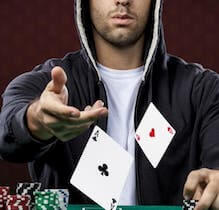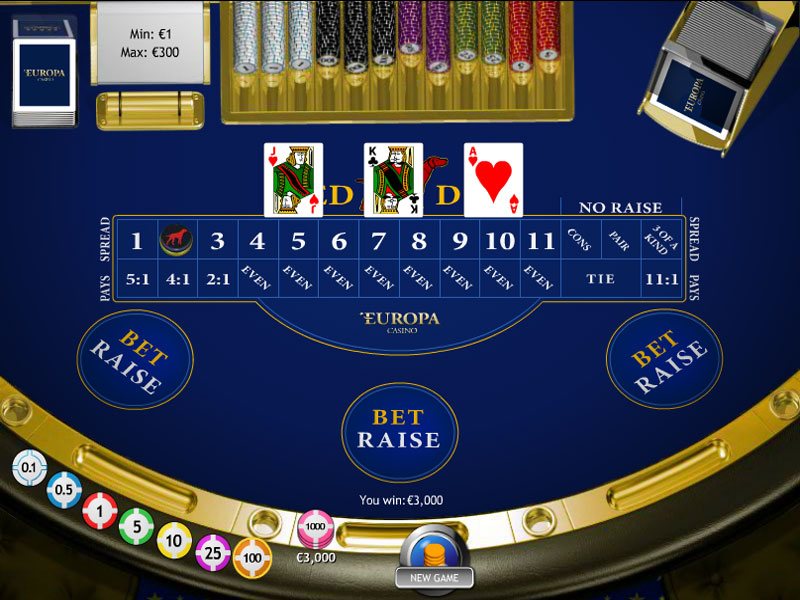Red Dog Card Game
There are also a few Red Dog variations, including a five-card version called high-card pool, but online casinos with Red Dog Poker stick to the basic premise. However, there are a few more intricacies to the game, especially if you’re playing Red Dog Poker for real money. Red Dog poker is a simple and exciting game of chance and luck where your outcome is entirely decided by the mercy of the cards and your degree of risk-taking. With a straightforward rulebook and odds that can vary, depending on your preferences, there really are some nice payouts that can be reaped here. Red Dog is a betting card game for three to eight players. Quickly calculate your odds to help win this game! Find the video tutorial and written explanation for how to play Red Dog below. Red Dog Tutorial. 52 card deck; three to eight players; poker chips.
Red Dog was originally a banking game in which punters bet on whether any card in their hand would be the same suit as and higher than a card to be dealt from the pack. This game, also called High Card Pool, and its variations Slippery Sam, Shoot and Polish Red Dog (also called Stitch or Polski Pachuck) are described on this page:
In American Casinos, the name Red Dog is now used for a different banking game (also called Ace-Deuce, In Between or Yablon) in which two cards are dealt face up, and the player bets on whether a third card will rank between the first two cards. That game is described on the Yablon page.
In the card games literature, there is quite a lot of variation as to which of the names Red Dog, Slippery Sam and Shoot are applied to which version of the game. If you have views as to whether the names on this page are correctly assigned to the variations, or if you are familiar with other versions, please let me know.

Red Dog / High Card Pool
A standard 52 card pack is used with cards ranking from ace (high) down to two (low). There can be from three to about eight players; each in turn will be the dealer - the first dealer is chosen at random.
Before the deal each player puts an equal stake (ante) into the pot. The dealer then deals five cards to each player, and the players look at their hands.
Starting with the player to dealer's left, going around the table clockwise and ending with the dealer, each player has a chance to bet. At your turn you choose how much to bet - you must bet at least the amount of the ante, and may bet anything up to the entire pot - and you place your stake next to the pot. When you have bet, the dealer burns one card (i.e. takes it from the top of the deck, shows it to the players, and adds it face up to the bottom of the deck) and then deals one card face up in front of you.
- If you have a card in your hand which is the same suit as the dealt card and higher in rank, you show this card, take back your stake, and the dealer gives you an equal amount out of the pot.
- If you have no card which is the same suit as and higher than the dealt card, you must show your whole hand, and the dealer sweeps your stake into the pot.

After everyone has bet, the turn to deal passes. Whatever was in the pot stays there for the next hand, and each player adds another ante to it (but if the players agree that the pot has become too large they may split it between them and ante to a new pot).
Variations
Some play that only four cards are dealt to each player. This enables a larger number of players to take part without the cards running out. Some play with only three cards dealt to each player.
Red Dog can be played with a bank put up by the dealer, as in Shoot or Slippery Sam; in this case the players do not ante, and if the pot becomes empty the deal immediately passes to the next player.
Shoot
The game is similar to Red Dog, but there are the following differences.
At the start, the dealer alone puts up a stake, which can be any amount between an agreed minimum and maximum.

The dealer deals just three cards to each other player. Players may not look at their cards until just before their turn to bet (when the previous player's turn is over).
At your turn, you may bet anything between an agreed minimum and the amount currently in the pot (obviously the agreed minimum for a player's stake must be less than the minimum that the dealer has to put into the pool). The dealer then turns up a card and you win if you can show a card from your hand of the same suit and higher in rank; otherwise you lose.
If the pot becomes empty, anyone who has not yet bet in that deal does not have a chance to do so. The deal immediately passes to the next player to the left.
If money remains in the pot at the end of a deal, the same dealer deals again. When the same person has dealt three times in succession they can choose whether to pass the deal on to the next player, keeping whatever is in the pot, or to deal a fourth time and pass the deal on after that, keeping whatever remains in the pot after the fourth hand.
Slippery Sam
This is also called Six-Spot Red Dog. The betting mechanism is the same as in Shoot, but the players bet on the basis of the dealer's turned up card, without having seen the cards in their hands.
The dealer deals just three cards to each other player, but they must not look at their cards. Then the dealer continues by dealing cards face up in the centre of the table until a six or lower appears. Each player bets on having a higher card in the same suit as the face up card. After the player has decided how much to bet, the player's whole hand is then exposed and the player wins the amount of the stake from the pot if it contains a higher card of the same suit as the dealer's card; if not, the player's bet is added to the pot.
If the pot becomes empty in the middle of a hand, the deal passes to the next player, who creates a new pot. At the end of a hand, the dealer retains anything that is left in the pot, and the deal passes to the next player.
Variations
In his Encyclopedia of Games (1973), John Scarne says that the following variation is popular in Fort Wayne, Indiana. The dealer deals three cards to each player and one face up in the centre. The player can either bet against this card or ask the dealer to deal another card - for which the player has to pay into the pot one fifth of what it contains (or some other agreed amount). If the player does not wish to bet against the second card, a third card can be called for at the same price. After paying for the third card the player may either bet against it or pass without betting, and the turn passes to the next player.
Polish Red Dog
This is similar to Slippery Sam, except that the players bet without seeing either their own cards or the dealer's card. It is described in Ostrow's Complete Card Player (1945), and the description is reprinted in various later books. Alternative names are Stitch and Polski Pachuck.
Red Dog Card Game

The banker's initial stake is a fixed amount, and a player's maximum bet is half of what is in the pot at the time. When the player has bet, the dealer burns one card (faces it and puts it on the bottom of the pack), and turns up the next card, and the player's three cards are exposed. If the player has a higher card of the same suit as the dealer's card, the player is paid from the pot twice the amount of the bet; otherwise the bet is added to the pot.
Acey Deucey Card Game Online
If the pot is busted (runs out of money), the deal immediately passes to the next player. Otherwise the same player continues dealing until at the end of a hand the pot is at least three times its initial size. At this point the dealer declares a stitch round - a final deal after which if the pot is still not busted the dealer collects whatever is in it and the turn to deal passes to the left.